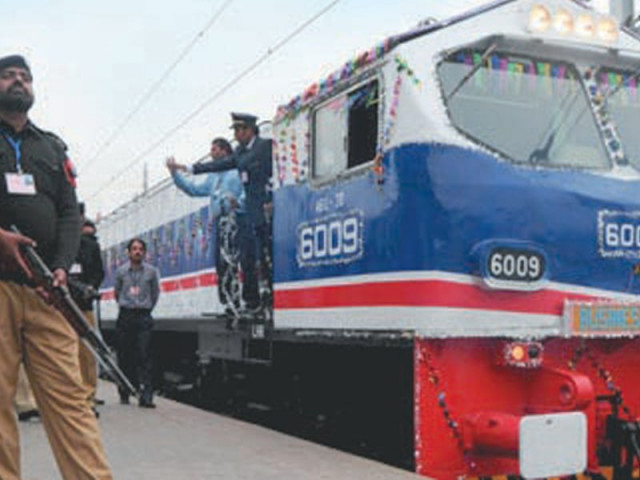Railway services: Four Brothers to launch another express train
Group believes after ‘success’ of Business Express, there is room for another venture.

The price quoted by Germany for a locomotive was two million euros, while the price quoted by India for an engine was $2 million. All coaches and engines will be leased for 20 years. PHOTO: FILE
Four Brothers Group – partner of Pakistan Railways in running Business Express – is planning to launch another express train, which is expected to be on track in 2014.
Though the perception of Pakistan Business Express does not seem to be well, but Four Brothers believes that the venture is gradually entering into profitability and there is a huge potential for the private sector in Pakistan’s railway service industry.
The planned rail service will operate between Karachi and Peshawar, for which Four Brothers will not rely on crisis-hit Pakistan Railways for coaches and locomotives as it did in the case of the first joint venture. The Group will import 22 coaches and five AG-30 Blue Tiger locomotives either from Germany or India.
Price quoted by Germany for a locomotive was two million euros, while price quoted by India for an engine was $2 million. All coaches and engines will be leased for 20 years.
“We have decided to start another train, the only thing we have to plan is from which country we should import coaches and engines,” said Mian Shafqat Ali, Director of Operations of Pakistan Business Express in an interview with The Express Tribune.
For Ali, the venture seemed to be profitable because he believed that the concept of quality travel via rail was quite new.
The company wanted to operate at different timings as it believed that it might not be possible for every passenger, whom they called guest, to travel at the same time.
Ali said reporting profits for any new company like Pakistan Business Express could take years, but the management was confident despite reporting heavy losses in the previous year.
Business Express is expected to break even this year and the company’s management hopes to see profits in 2014, during which Four Brothers believes it can start another venture.

Occupancy rate was the biggest issue the company faced in its first year due to the seasonal nature of the business, according to Ali. Though Business Express’ occupancy rate hit 100% a few times in the summer, but during off-season the rate dipped below 50%.
On the other hand, the economy class segment of Business Express had reported profits for the full year.
After long dialogues with Pakistan Railways, the company managed to bring down agreed occupancy rate to 65% from 88%, which allows the business train to cut back on annual pocket money that it gives to the Railways to Rs850 million from Rs1.14 billion. This means that the daily liability had come down from Rs3.1 million to Rs2.2 million at the new occupancy rate.
Business Express had paid Rs850 million to the Pakistan Railways in the first year. However, the liability for the previous year, which stood at Rs330 million, had been deferred by the Economic Coordination Committee for a year.
The management of Business Express was looking to get a relaxation from this liability for which it had once again initiated negotiations with the authorities. The company had over 350 employees and was incurring Rs4 million a month as salary expense.
“We did not start Business Express to close it down at some stage, though we faced many hurdles,” said Ali, adding “critics were of the view that we might not be able to run the business for as long as 15 days, we are operating ‘wonderfully well’ and people want to travel with Business Express due to its punctuality and quality of service.”
“We are about to introduce innovations in our trains, which were employed by only a few countries. As we are the pioneers of this segment in Pakistan, we want to maintain our quality and services so the new entrants in the industry have an example to follow,” Ali added.
Published in The Express Tribune, April 4th, 2013.
Like Business on Facebook to stay informed and join in the conversation.



















COMMENTS
Comments are moderated and generally will be posted if they are on-topic and not abusive.
For more information, please see our Comments FAQ